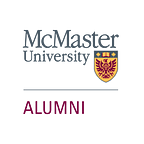Life After Mac: Real Stories of Alumni Finding their Way- Ben
I was told that I would never ride a bike. I was told that I would never learn at the level of my same-aged-peers. It’s a good thing that I didn’t listen.
In childhood and adolescence — as an individual with a disability — I spent a great deal of cognitive and physical energy pushing against the grain of ableism. I was bullied for physical differences. Coaches would not allow me to play sports without a signed letter (of insurance) from my neurosurgeon. I did everything I could to be accepted, to be considered normal. With the support and encouragement of support networks that believed in my ability and potential, I moved on to McMaster.
In 2009 to 2014, my path seemed clear: I was a Mac student, completing studies, volunteering and working. On a university campus with many opportunities for growth and success, I could be myself and had the opportunity to explore my interest in research. With diverse experiences in neuroimaging and quality research supervision, I was fortunate enough to acquire a Sick Children’s Hospital summer research experience immediately following my departure from Mac. As a brain tumour survivor, I was excited to work with a world-renowned researcher and clinical psychologist who was conducting paediatric brain tumour neuroimaging research.
It seemed like I had my future planned: working at SickKids right out of undergrad in a line of research that seemed fitting and notable. In reality, I was more uncertain than ever. I had a fantastic research experience but realized through my time at SickKids that research without regular patient contact wasn’t for me. Truth be told, I quietly had some doubts about my future in neuroimaging research and — thanks to a course I had taken at McMaster — I had begun to explore clinical psychology graduate programs, and mindfulness intervention research back in 2013 and early 2014.
I was 24 at this time and I knew that I would need to acquire a few years of experience in relevant mental health intervention research to become competitive. But that would also mean that I would be in my 30s before I could start my career. Speaking with psychologists and other health professionals, I was cautioned and discouraged over and over. Clinical psychology programs require seven years of further education and are extremely competitive — akin to medical school. But deep down, I knew I wanted to be in this line of work.
So I made a lateral career move and started as a research assistant at another hospital in Toronto. Over two years, I worked for fantastic psychiatrists in mindfulness and cancer research. During this time, I also fielded relatively constant questions about what I was doing and where I was going:
“So, what are you up to now? You’re working at a hospital, but what’s the plan?”
“You’re done school right? No!? So what, are you going to be in school forever?”
“Oh, clinical psychology, eh? Are there going to be any good paying jobs after?”
There was doubt and concern in the air around me but — since I saw my lane — the noise around me didn’t matter. I just kept working towards my goal.
Today, I am wrapping up my second funded year of my Masters in Clinical Developmental Psychology at York University — in which I study mindfulness intervention efficacy and mental wellness — and am projected to move onto my PhD in the fall. As a grad student, mental health researcher, and clinician-in-training, I still face ableism. I still field questions about what I am doing with my life, and what clinical psychologists do. I address these barriers and annoyances in my road with a smile and strategic persistence.
Yes, I will be 30+ when I begin my career. But with patience, focus and the support of my friends, family and mentors — who have been riding with me for years, and those that hop on along the way — I will keep working towards my goals.
Sincerely,
Ben Diplock,
Honours BSc Psychology, Neuroscience & Behaviour ‘14
Email: bdiplock@yorku.ca
LinkedIn
The McMaster Alumni Association, over the course of the next year, will be featuring one grad’s career story each week. If you graduated in the last 10 years and are interested in sharing yours, please email Nada at elnaien@mcmaster.ca.
If you are looking to get started on your own journey check out resourcesavailable to recent graduates through the Student Success Centre.
